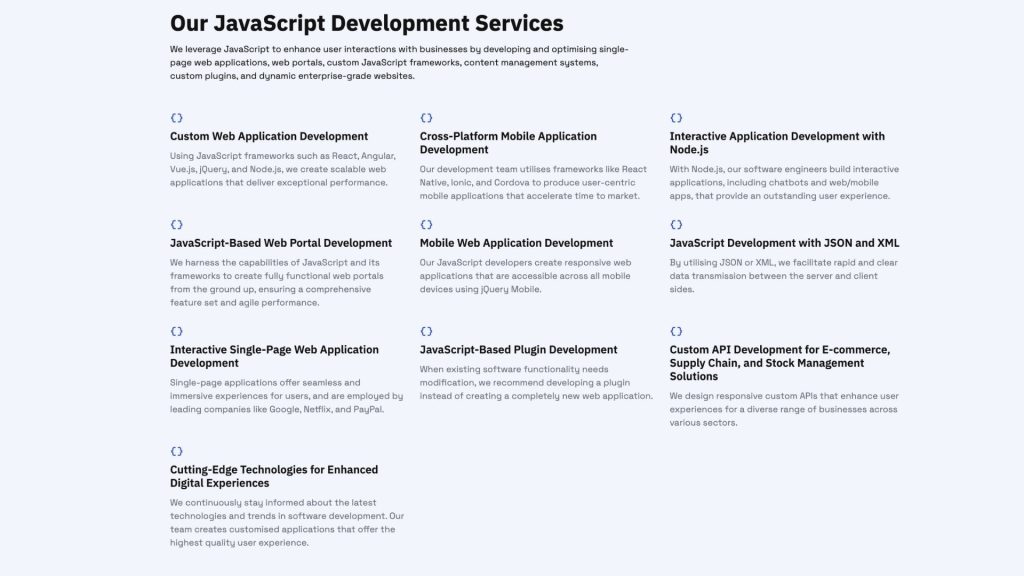In today’s digital landscape, JavaScript has established itself as the backbone of modern web applications. From interactive user interfaces to scalable back-end solutions, JavaScript empowers developers to build dynamic and high-performing applications. As one of the most widely used programming languages, it supports a vast ecosystem of frameworks and libraries, making it the go-to choice for web development.
In this article, we explore some of the best web applications built using JavaScript and examine how this technology is shaping the future of online experiences.
1. Gmail – Revolutionising Email Communication

Gmail, Google’s flagship email service, is a prime example of JavaScript’s capabilities in creating fast, interactive web applications. Built with JavaScript and powered by frameworks like AngularJS, Gmail offers:
- Seamless real-time updates that enhance the user experience
- Efficient client-side rendering for a faster and more responsive interface
- Robust security features integrated through JavaScript-powered APIs
With JavaScript enabling asynchronous loading, Gmail provides a smooth, clutter-free experience for millions of users worldwide.
2. Facebook – A Social Media Powerhouse

Facebook relies heavily on JavaScript to deliver a highly engaging and interactive social networking platform. Through React.js, a JavaScript library developed by Facebook, the platform offers:
- Virtual DOM for enhanced performance
- Component-based architecture that improves code reusability
- Dynamic content updates without reloading the page
By leveraging JavaScript’s scalability, Facebook continues to enhance user engagement with real-time interactions and seamless content delivery.
3. Netflix – A High-Performance Streaming Platform

Netflix, one of the world’s leading streaming services, utilises JavaScript to ensure an optimal viewing experience. The platform uses Node.js on the backend and React.js on the frontend to provide:
- Ultra-fast loading times for seamless streaming
- Intelligent content recommendations using JavaScript-driven machine learning algorithms
- Cross-platform compatibility for a unified experience on multiple devices
JavaScript plays a pivotal role in Netflix’s ability to deliver high-quality video content with minimal latency.
4. LinkedIn – A Professional Networking Giant

LinkedIn, the world’s largest professional networking platform, transitioned to Node.js for its backend to improve performance and scalability. JavaScript enables:
- Fast and responsive user interfaces through React.js
- Efficient data handling and real-time updates for messaging and notifications
- Enhanced search functionality using JavaScript-powered algorithms
By integrating JavaScript technologies, LinkedIn has significantly improved the platform’s speed and responsiveness, providing an enhanced user experience.
5. Trello – Simplifying Project Management

Trello, a widely used project management tool, is built with JavaScript and relies on Backbone.js for its front-end development. JavaScript enables Trello to offer:
- Drag-and-drop functionality for seamless task management
- Real-time updates to enhance collaboration
- A highly responsive interface suitable for both desktop and mobile users
Thanks to JavaScript, Trello remains a preferred choice for businesses and individuals managing tasks efficiently.
6. Uber – Redefining Ride-Sharing Services

Uber, the global ride-hailing service, leverages JavaScript and Node.js to ensure a seamless user experience. JavaScript powers Uber’s:
- Real-time ride tracking with dynamic updates
- Efficient request handling through an event-driven architecture
- Scalable microservices to support millions of users globally
By utilising JavaScript’s versatility, Uber ensures quick response times and an intuitive ride-booking process.
7. PayPal – A Leader in Online Payments

PayPal, a widely used online payment platform, transitioned to JavaScript and Node.js to improve its transaction processing. JavaScript enables:
- Faster server-side processing through Node.js
- Enhanced security features for safe online transactions
- Scalability to handle millions of users simultaneously
With JavaScript at its core, PayPal ensures secure, efficient, and seamless financial transactions worldwide.
Why JavaScript is the Preferred Choice for Web Applications
JavaScript’s dominance in web development stems from several key advantages:
- Cross-Platform Compatibility: JavaScript runs on all modern browsers and supports both front-end and back-end development.
- Rich Ecosystem: Popular frameworks like React.js, AngularJS, and Vue.js enhance JavaScript’s capabilities.
- Asynchronous Processing: JavaScript’s event-driven model allows for non-blocking operations, improving application speed and efficiency.
- Scalability: With technologies like Node.js, JavaScript enables the development of highly scalable web applications.
How Dev Centre House Ireland Supports JavaScript Development
For businesses looking to build high-performance web applications, Dev Centre House Ireland provides expert JavaScript development services. Their skilled engineers specialise in front-end and back-end solutions, ensuring seamless, scalable, and innovative web experiences.

From social media giants to fintech leaders, JavaScript continues to revolutionise web application development. Its flexibility, efficiency, and vast ecosystem make it the language of choice for developers worldwide.
If you’re planning to build a JavaScript-powered web application, partnering with Dev Centre House Ireland can help bring your vision to life with cutting-edge, scalable solutions.
